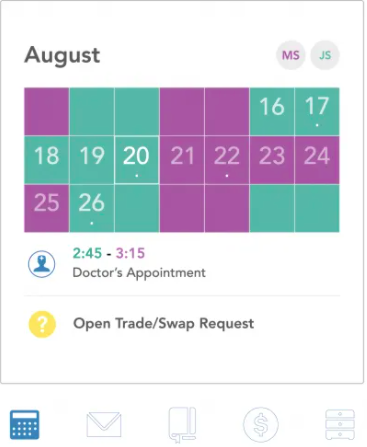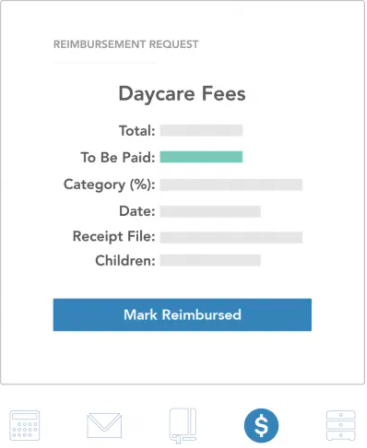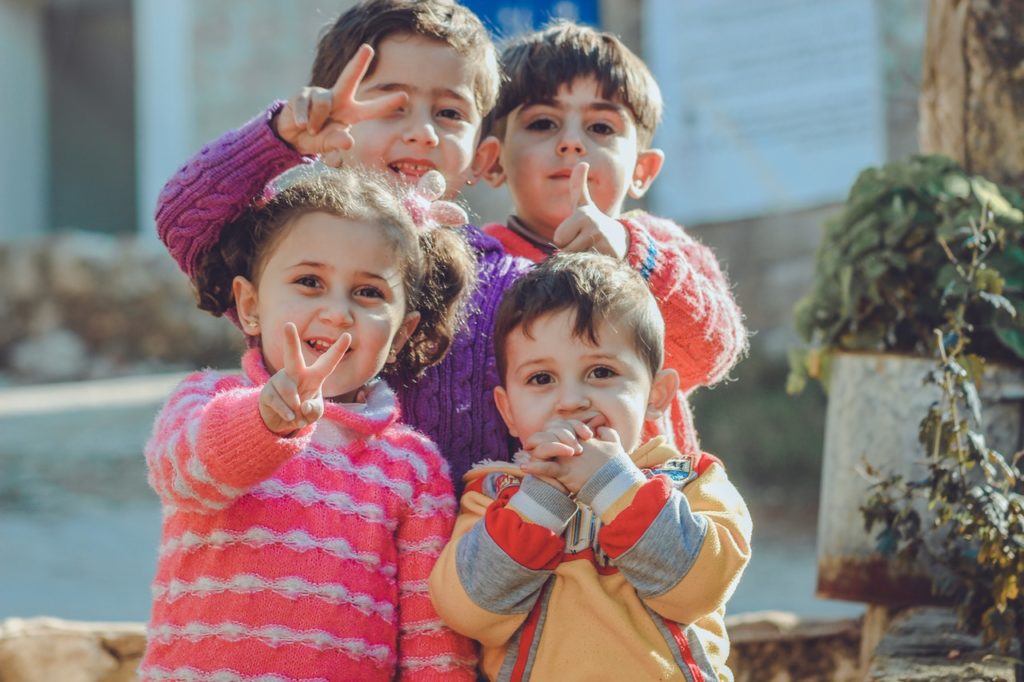There are many aspects of development that parents must consider when co-parenting within a blended family. This is the nature versus nurture argument, and both factors heavily affect each child in the household. There are important aspects when it comes to child development in a blended family because of the new dynamic everyone has to adjust to.
By taking the time to assess where the development of each child currently is and altering your terminology to align with the goals of your family, you’ll go from being a blended family in truth to a blended family in name only. In other words, you can either act like a blended family, full of bio vs. step, or you can act like a family, regardless of biology.
One of the best way to develop a child in a blended family is to structure a way where both the biological and step-parents can communicate with each other with an easy-to-use platform on the different aspects of the child’s life (If in good standing and they both have custody).
This means being involved in knowing what is going on in the child’s life. Things like their daily schedule, money being spent on the child, health issues, and many more!
One of the biggest issues that occurs between blended families is the lack of communication between the parents.
It creates a form of tension that should be avoided. A way to combat this problem is to have the family management skills that make it easier for both parties to communicate about the child’s well-being.
With that being said, we have joined forces with ourfamilywizard to bring you an app that lets you have the tools necessary to be able to stay on track with anything that goes on with your child.
This platform comes with:

Calendar

Message Board

Journal

Expense Log

Bank Info

Notifications on the spot!
The reason why having this type of platform helps develop a child in a blended family would be because this will build a structure within the family.
This structure building will in turn develop the child in a healthy co-parenting environment instead of a toxic one.
We have many seen great results with families that have used this program and we recomended it for every family that is blended.
What Are The Three Developmental Aspects?
When it comes to our children, especially within blended families, we want to be aware of three crucial developments:
- Mental
- Social/Emotional
- Educational
Each one plays a vital role in their upbringing, and they’re intertwined, meaning that if the needs for one aspect aren’t being met, they cannot successfully develop the others. Let’s break it down a bit.
Mental
Mental development (also known as cognitive development) isn’t all about smarts. This aspect is the different way in which a child thinks about the world.
For instance, as a baby, they can touch and feel the water. They might not yet have a name for it, but the tactile sensation is categorized in their brain.
Next, in their toddler years, they connect the substance with the word “water.” As they get older, they begin to understand different versions of water, such as ice, rain, snow, etc., building an intrinsic understanding that the substance has remained the same. The last stage is when they become rather philosophical, as in “the glass is half full or half empty.”
When we apply this to family, it takes on a whole new meaning.
As babies and toddlers, they are taught the nuclear family concept: mommy, daddy, brother, sister, grandpa, etc. In a traditional family, they grow up, and these are concrete ideas, but in a blended family, there’s an additional “step,” as in mommy versus stepmom and sister versus stepsister. It can be challenging for them to process the difference.
The younger they are, the more difficult it is for them to separate these people into categories.
For instance, a stepsister is just a sister for many of the youngsters. Once in the teen years, these separations become very important to them as they test boundaries. Which version should I listen to? Do I side with my sister or stepsister during an argument? Do I spend more time with my mom or my stepmom? Is what my father says more accurate than what my stepfather says?
The significance placed on the biological versus step creates feelings of guilt and confusion (hence impacting the social and emotional aspect). In some cases, they can feel like they’re betraying their biological family members by treating the stepfamily as a real family.
For this reason, we don’t use the term step in our house. I call my stepchildren my bonus kids if I need to differentiate, or simply my children. Similarly, my bio-daughters call their stepsisters and half-sisters their “sisters.” We do not place extra value on blood relations, and everyone is equal.
This is why it’s essential to pay attention to mental development and assure them that family is family, biology aside.
They will take their cues from you which means that the lines you draw are the ones they will follow throughout their childhood. Their intrinsic understanding of the family is based on your presentation of it so make sure you are aware of how you act when it comes to the emphasis of the family.
Once they’ve gotten well into their teen years and early twenties, they’ll place value upon each member in direct relation to trust and exposure, and the “step” becomes irrelevant. Still, until then, they need careful guidance and reassurance.
Social And Emotional
The social and emotional aspect directly impacts the way they communicate with the world and the level of comfort they have asking the people around them for their wants and needs.
This is everything from language development to stranger danger and self-esteem to empathy. In a traditional family, it’s easily defined. We trust mommy and daddy, we’re nice to our sisters and brothers, and we don’t talk to strangers. Within blended families, this aspect becomes cloudy.
Suddenly, there are three or more parents, half the siblings are strangers, and self-esteem can easily be toppled if comparisons are made.
The younger the child is, the more influential the surrounding family members are on their social and emotional development. You’ll notice that toddlers tend to parrot back phrases they’ve heard, ask for things, or explain concepts.
They turn to people they trust to engage with and are very open and friendly with long-term exposure. Toddlers love with abandon and don’t label people based on relations.
If you’re fortunate enough to be the stepparent of a toddler, understand that they will bond with you and turn to you for their social and emotional needs. You become a very crucial part of their development.

As they grow older, they begin to internalize the influence and base it on the reaction of peers, which is when self-esteem is heavily impacted.
If favoritism is being shown to one child over another, it can stunt the social and emotional development of the other child. This is unacceptable and is one of the main reasons biological and stepparents must be careful to show each child that they hold value within the family regardless of relation.
This isn’t a problem specific to blended families, though. It happens within traditional families all the time, but blended families have an added layer of difficulty because the bonds are developing at different rates.
In our house, all children are treated equally and celebrated for their differences.
This does not mean we have a blanket reaction to each circumstance. Since no two children develop at the same social and emotional rate, we carefully monitor each child’s self-esteem and bolster them when needed. If one child is struggling and the other is doing fine, praising them both isn’t the answer as it devalues the praise for the child who is struggling and feels disingenuous.
Focusing on the journey and the path instead of the results can go a long way towards meeting each child’s individual needs. For instance, facing a crowd of people for a child with social anxiety is a huge step, while spending time alone and entertaining oneself could be the action that gets the other child a high-five.
Each child has different social and emotional development goals, and as parents, it’s our job to recognize that.
Educational
The educational development of each child is when nature versus nurture truly comes into play. An important aspect in child development in a blended family is making sure their education is at its best.
Genetics plays a significant role in our abilities to grasp a concept, and some kids will need more nurturing than others to achieve the same results. Throughout school, children must be celebrated for the successes that are achievements for them and not be compared to each other.
For this one, we’re throwing the concept of the blended family out the window and focusing solely on the roles of parents (regardless of relation) in making sure that each child is hitting the appropriate developmental milestones or getting the extra help they need.
All parents should be in every meeting with the teachers if possible. If not, an open and honest dialogue needs to happen regularly to keep everyone up to date. Each parent should understand what each child is learning and what is expected developmentally at every grade level.
If a child is struggling and needs evaluation resulting in an IEP or 504, every guardian needs to be aware of what’s in that document and how it affects the child’s day-to-day.
This is a team effort between the parents and teachers to bring the child to their utmost potential, and each parent adds value to the experience by bringing a different thought process and set of skills to the situation. Children do best when they have a support system focused on them, not on the disparities between the co-parents.
Our eldest child had an IEP, and we mirrored the contents at home.
Even though he was my bonus child, I was still the one helping with math homework and reading daily. If I hadn’t been fully aware of how he was taught within the school, I wouldn’t have been able to teach him in a way that he could process the information.
Similarly, sometimes I was the only one available for the meetings. I would have frequent talks with his mother and father about his progress and always made sure they knew when meetings were being held and what the results were. This open communication was imperative to his success as he navigated middle school and high school.

Related: Ways to build structure in a blended family
The Takeaway – Child Development In A Blended Family
If a child is not developing at the ideal rate mentally, socially, or emotionally, they cannot succeed educationally, and these developments need to be taken into account and assessed regularly.
Frequently, co-parents blame their counterparts instead of setting aside their differences and working together, resulting in “the blame game,” which adds a level of emotional intensity that a child will pick up on and misconstrue. It also teaches them social cues on how to play the blame game later on.
When it comes to child development in a blended family, you need to remember that you as parents are a united front. Under no circumstances should the child feel that their needs are a burden or that the parents aren’t responsible for ensuring proper development.
By focusing on all three aspects of development, creating an environment where everyone is family, and creating no separation, every child will thrive. It’s okay if thriving means a C+ for one child and an A- for another. This is all about the maximum potential for each child.
Keep a dialogue open with your partner and other co-parents concerning the child’s development, and stay away from buzz words that lay blame if there is an issue. You are adults, and you are all in this together. If you argue about the stepchildren in front of them, they will take the anger as their fault, toppling the hard work you’ve put into their development.
If there is a disagreement, consider finding a neutral third party to help with the dialogue away from the children’s ears.
As always, thank you for your hard work in parenting your children. It is a challenging and often thankless job, but they are our future, and creating kind, compassionate people to lead us into a new age of acceptance is crucial for a world filled with laughter and light instead of hatred and division.
